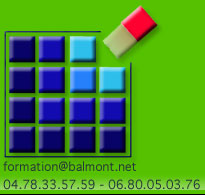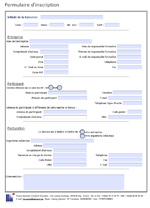Accueil > Formations > Training in english > Effective delegation skills
Effective delegation skills
Delegation can be one of the most difficult skills for a manager to master. This skill can be learnt to become one of the most valuable skill he can master.
The capability to delegate prepares your team to handle some of your responsibilities and allows you to progress towards reaching major targets.
It helps you identifying all prior matters, during and after a delegated task. You learn the various sides of delegation, including when to delegate and who to delegate to.
It provides you with an efficient delegation model effectively. You understand the benefits you can get from delegation and as a key development tool to motivate your team.
Educational methods
During this training, the participant transposes specific situations to become aware enough to go for change. The participant can freely express himself (herself) on one's
capabilities and difficulties. He(she) quickly and efficiently integrates this training as practical exercises and various situation scenarios make it a positive model. Also video
testimonials of managers from other companies allow to share the vision of the other managers / project managers.
Objectives
 Monitor with a toolbox, understand and apply new behaviors and action levers to delegate Monitor with a toolbox, understand and apply new behaviors and action levers to delegate
 Manage to get the benefits of effective delegation. Detect and develop the skills and the autonomy level of team members Manage to get the benefits of effective delegation. Detect and develop the skills and the autonomy level of team members
 To know what and when to delegate and how identify the best team member to delegate to To know what and when to delegate and how identify the best team member to delegate to
 Practise the effective delegation Practise the effective delegation
 Practise using questions to review progress and giving feedback on their progress Practise using questions to review progress and giving feedback on their progress
 Enhance team members motivation Enhance team members motivation
Detailed Program
Expand your influence capacity to negotiate
1. Why delegate and identify the benefits ?
- Set your profile to delegate
- What is delegation ?
- Clarify your motivations and barriers to delegate
- The impacts and benefits of good delegation to colleagues
- Link management style with your own way to delegate
- How delegation develop autonomy of your employees
- Key principles for effective delegation
- Assess your ability to delegate and your areas for improvement
Individual brainstorming to identify your personal targets
Self diagnosis of your profile to delegate
Exercise by two ; group discussion and review
Individual exercice to identify what you can delegate to colleagues and/or to employees
2. How to delegate effectively ?
- Identify your priorities
- The objectives of the delegation
- Identify what can be delegated and to whom?
- Principles and attitude for a successful delegation : how to facilitate the process and overcome the resistances and fears, to promote the autonomy
of the team member, to promote the achievements of your colleague, guide efforts to formulate solutions
- Delegation styles depending on the profile and the degree of autonomy of the team members
- Communication delegated task : six steps for a successful briefing in order to delegate a task
- Define assessment criteria
- Appropriate behavior for successful delegation
Test: how do you delegate ?
Exercice : Set up your priority matrix
Exercice to identify core team skills using team skills Matrix (source : Situational Leadership)
Training, briefing and debriefing
3. Monitoring progress and giving feedback to the team
- What communication skills help getting results ? Three components of communication skills : listening, the art questionning, and testing
- Efficient ways of monitoring delegation and how to give feedback to those you have delegated tasks to
- Measure the skills of your employees
- How to motivate, to help to advance and to empower your team members by practicing the delegation, to maintain a relationship of trust with your team
- Evaluate the success of the delegation to colleagues
- Review of learning and action planning
Scenario: developing a progressive delegation plan to one of your team members
Scenario : Managing a delicate situation for a follow-up interview of the delegation
Personal Action Plan: Actions to implement to know how to effectively delegate
|
















